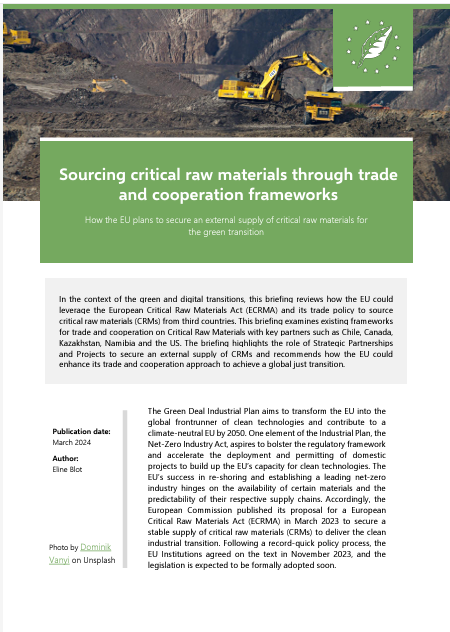Authors: Eline Blot
This briefing examines existing frameworks for trade and cooperation on Critical Raw Materials with key partners such as Chile, Canada, Kazakhstan, Namibia and the US. It highlights the role of trade and cooperation approaches to achieve a just and clean global transition.
The Green Deal Industrial Plan aims to transform the EU into the global frontrunner of clean technologies and contribute to a climate-neutral EU by 2050. One element of the Industrial Plan, the Net-Zero Industry Act, aspires to bolster the regulatory framework and accelerate the deployment and permitting of domestic projects to build up the EU’s capacity for clean technologies. The EU’s success in re-shoring and establishing a leading net-zero industry hinges on the availability of certain materials and the predictability of their respective supply chains. Accordingly, the European Commission published its proposal for a European Critical Raw Materials Act (ECRMA) in March 2023 to secure a stable supply of critical raw materials (CRMs) to deliver a clean industrial transition.
This briefing considers how trade and cooperation frameworks can support the European Critical Raw Materials Act’s objective to diversify and secure the EU’s external supply of CRMs. It proposes recommendations on how the EU could enhance its trade and cooperation approaches to achieve a just and clean global transition.
Despite the EU’s ambitions to scale up its domestic capacity to source CRMs, it remains reliant on the imports of third countries, especially if European resource use, rather than resource efficiency, continues to expand. Accordingly, the EU has sought like-minded countries such as Australia, Canada, Chile, and the US to cooperate more closely on integrating CRM supply chains. Yet, the EU will still be required to navigate the BRICS countries as they house many raw materials reserves, particularly those essential for the green and digital transitions.
On the other hand, the EU’s ECRMA endeavours to leverage the roll-out of Strategic Projects using the Strategic Partnerships as a loose framework to set the terms of cooperation on CRMs with a third country. Yet, this strategy is by no means a recipe for success as the Strategic Projects and Partnerships:
- Do not uphold a sufficiently high level of ESG standards to ensure that projects and third countries’ regulatory frameworks are aligned with international agreements and standards.
- Lack concrete definitions or initiatives to foster value addition in the trade partner country, missing the opportunity to contribute to long-lasting benefits through green industrialisation.
- Fail to prioritise the roll-out of circular projects and business models, such as recycling or processing projects employing circular best practices.
As a result, this briefing concludes that no existing trade or cooperation agreement for raw materials incorporates strong language or meaningful incentives to add value in a trade partner country. This finding is a serious missed opportunity for the EU in the context of the green and just transition. It highlights the need to re-evaluate priorities vis-à-vis EU strategic autonomy versus global cooperation for a clean transition. Especially in the current context with rising trade barriers, it is unlikely that trade in CRMs will become smoother in the future without mutually beneficial cooperation outcomes.
This briefing puts forward the following recommendations for the EU to pursue mutually beneficial CRM Partnerships aligned to accelerate a transition to a more circular global economy by facilitating the trade of secondary CRMs. A sustainable CRM trade and investment agreement should prioritise:
1. Binding commitments for the Parties to effectively implement multilateral environmental agreements, tackle ESG concerns linked with the mining of CRMs and adhere to responsible mining standards such as the IRMA.
2. The uptake of financing opportunities to promote circular business practices along the CRM value chain, including extended producer responsibility for the recovery and responsible treatment of end-of-life goods.
3. Value addition in third countries to support green industrialisation efforts by:
- Supporting technological developments by investing in R&D, encouraging technology transfers through joint venture partnerships or licensing, capacity building and knowledge sharing share best practices along the CRM value chain and advancing circular business practices.
- Prioritising processing and recycling projects above extractive projects, which, in comparison, generate little added value for local communities.
- Providing financing incentives for projects in third countries that aim to purchase domestically mined CRMs and processing them locally.
4. Ensure WTO compatibility, for example by emphasising that the objective of the sustainable trade and investment agreement should be linked to the responsible use of CRMs for the clean transition, and the agreement should allow for the progressive inclusion of other countries to broaden the scope of coverage.
5. Facilitate the trade and use of secondary raw materials by promoting international cooperation to establish a global market for secondary raw materials and avoid market fragmentation caused by divergent standards for secondary raw materials. Such international dialogues should discuss:
- The role that primary raw materials inputs still play as a source of secondary raw materials and how a profitable market for secondary raw materials could benefit from mixing primary and secondary materials to create economies of scale.
- How to ensure existing trade rules do not disincentivise or hinder the trade of secondary raw materials, for example by revising the Harmonised System (HS) codes to facilitate extra-EU trade of secondary materials. In particular, the EU should also consider the revision of the Waste Framework Directive and the Waste Shipments Directive.
Photo by Dominik Vanyi on Unsplash



